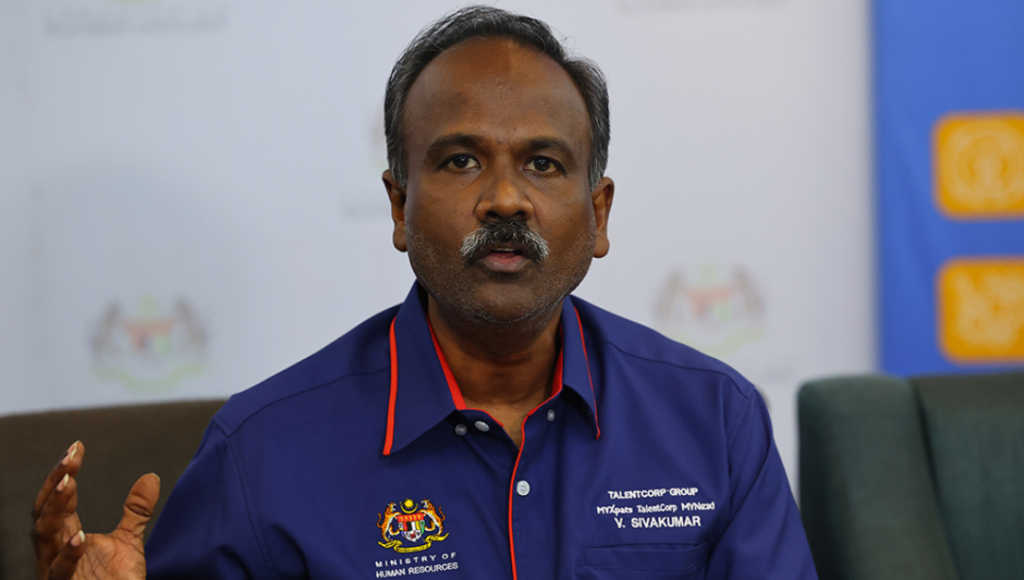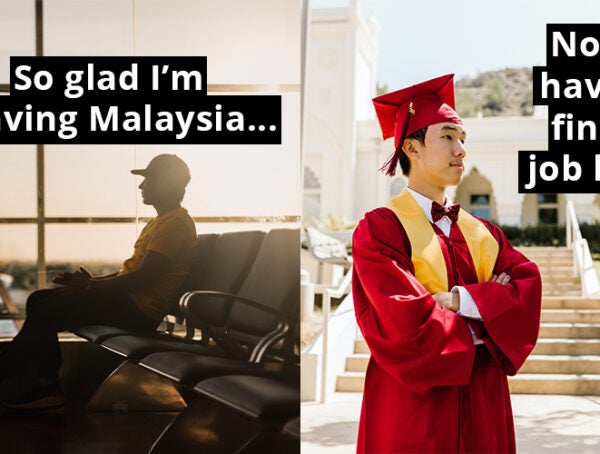Disclaimer: In Real Life is a platform for everyday people to share their experiences and voices. All articles are personal stories and do not necessarily echo In Real Life’s sentiments.
Subscribe to our Telegram for updates.
A recent viral video has reignited the conversation around Malaysia’s brain drain problem.
In the Tik Tok video, former straight A’s student Jessica Sin shared her experience of been rejected from a local JPA scholarship, but found that other candidates that had less stellar results were able to get the coveted scholarship.
Brain drain is what happens when young Malaysian talent gets passed over from being selected for local university scholarships, leading them to pursue overseas opportunities and never come back.
Putting the question of fairness aside, is Malaysia effectively driving away their top talent when the criteria for selecting worthy recipients of the scholarship does not seem to be based on academic merit?
“Malaysia has failed me,” shared straight A’s student

Jessica Sin shared that she had scored 9A+ for her SPM results in 2010 and was very active in extracurricular activities, holding several leadership roles and even representing her school in various competitions.
However, when she applied for a scholarship to further her studies abroad, the reality of Malaysia’s race-based scholarship quota became obvious.
“I applied for a JPA scholarship from the Ministry of Education but my dreams of furthering my studies abroad were crushed when they rejected it,” Jessica recalled.
“Later, I found out that Bumiputera applicants who only scored 3 or 4 As were awarded funding to go abroad for up to 5 years,” she added.
Undeterred, Jessica applied to foreign universities for financial aid. She was surprised and relieved to receive offers for full scholarships, including living expenses without bond, from universities in Australia and the United States.
Jessica went on to graduate with a Dean’s Honour Roll from the University of Queensland. She has recently obtained her MBA with a full scholarship from Quantic School of Business and Technology. Currently, Jessica is working as an investment strategist.
“We need to appreciate the talent that we have and not drive these people abroad.”
“I respect the Bumiputeras for having special rights, but what kind of message is this sending to SPM students who are non-Bumi? Should we just give up on our dreams because we were not born as the right race?” Jessica asked in her video.
Some say that scholarships should be awarded based on meritocracy, and favouring one ethnic group over others does more harm than good to the unity of the country.
Others argue that such policies exist to help the more disadvantaged and impoverished, which the majority happen to be from the Malay population and therefore is necessary and justified.
But another side-effect of the policies is that Malaysia’s top brains are being drained away to contribute to the economies of other countries, at the expense of our own development as a nation.
“We need to appreciate the talent that we have and not drive these people abroad,” shared Jessica.
How many bright young people like Jessica have we lost due to our discriminatory policies?

“Malaysia’s brain drain has reached a level that has got the government taking it seriously”, according to the Human Resources Minister V Sivakumar
Well, according to the Ministry of Human Resources, apparently 1.8 million. That’s 5.5% of our nation’s population, well above the global average of 3.3%.
That’s 1.8 million of our finest and smartest Malaysians who are contributing to other countries’ economies, with 1.13 million who are working in Singapore.
What if bigger countries like Japan and China decide to loosen their immigration policies to address their labour shortages? Then the problem could even accelerate in the next few decades.
If nothing is done to plug the leak, we risk a stagnated economy and poorer standards of living across the board.
Not to mention we have created a disillusioned generation who would rather pursue greener pastures abroad than stay to uplift a country that treats them like second-class citizens.
How the education quotas in public universities came about
The ethnic quota was part of the social engineering initiative known as the New Economic Policy (NEP). It was introduced in 1971 and was conceived to eradicate poverty and achieve national unity through economic restructuring.
So how did a policy that was originally intended to bring up the impoverished end up favouring one ethnic group over others?
Back then, the highest poverty rates came from the Bumiputera population, and therefore it made sense for them to benefit most from this policy.
However the policy was originally designed to run for 20 years, and end once it achieved its goal. But Mahathir extended it in 1991 with the NDP and they keep renewing it until today.
Unfortunately, the poverty rate amongst the Malays remains the highest at 7.2%, causing many to question the effectiveness of this 50 year-old practice.
When confronted with the issue recently by a student at Universiti Utara Malaysia, Prime Minister Datuk Seri Anwar Ibrahim said the quota system is still necessary to maintain racial balance in enrollment for certain programmes.
However he acknowledged that more needs to be done to ensure high-achieving non-Bumiputera students get a fair chance in being accepted in public universities.
Is Malaysia Failing The Younger Generation? Netizens Share Their Views




Loonchai from Reddit posted: “ Why hasn’t the 60+ years of quota system achieved its intended goal, which is to uplift the education and competitiveness of the bumis? Instead of doing what it is designed for, has it instead suppressed the bumis due to lack of meritocracy and competitiveness?”
Twitter user Adzizi said: “I’d rather have a quota for B40 to M40. Race quotais giving too much advantage to the Malay elites in the T20.”
Twitter user 23yo Bumpkins said: “Instead of using solely racial criteria, why not use wider socioeconomic criteria instead, such as lower income families,first generation university students, rural and pendalam residents,disability, etc?”
Twitter user Khairul Fadzly said: “I as an individual feel that acceptance should be on merits, but I as a Bumiputera am reluctant to let it go because I still feel the need for it and DSAI (Prime Minister Anwar Ibrahim) who has all the data and percentages in possession also feels the need to continue I have to agree with him.”
At the end of the day the narrative of the poor student with great results being given a chance to shine academically is a feel-good narrative that isn’t always reflective of reality.
How do we change that for the better?
It’s 2023, time to plug the brain drain
It has been more than 50 years since the NEP has been implemented, yet from a certain perspective, it has hardly shown signs of achieving its intended goal, and has only managed to foster more resentment and tension among Malaysians.
Every time this topic comes up, the conversations are always the same and always centre around nepotism, racial politics and the dismal state of our economy.
But underneath all the anger and apathy is actually frustration and helplessness over the country’s lost potential.
Regardless of their race, most Malaysians love Malaysia and just want to contribute to their homeland and see it prosper.
But when the powers-that-be insist on preferential policies and continually pass over hardworking and talented people, they get the message that they’re second-class citizens in their own home.
What Malaysia ends up with is not only a subpar workforce that is not able to compete with the global economy, but also a jaded segment of the population who will teach their children to look abroad if they want to have a fair chance at life.
We need to start appreciating people’s talents and reward them based on their merits, otherwise they will seek out opportunities elsewhere and that is a huge loss to Malaysia’s economy.
It’s time to plug the brain drain and move forward. What do you think, fellow Malaysians?
How can Malaysia solve the brain drain issue?
Share your thoughts in the comments!
For more stories like this, read:
Malaysia Has An Ongoing Brain Drain Problem: This Is Everything You Need To Know About It
You might also like
More from Real People
‘A RM100 fee cost a company 5 years of revenue’ shares M’sian
This story is about a Malaysian who learned that bureaucracy can be defeated simply by not arguing with it.A billing …
‘I quiet-quit, upskilled, and tripled my salary,’ shares M’sian engineer
This story is about a Malaysian who learned that loyalty without leverage leads nowhere in the corporate world.After years of …
‘I did everything right, and it still wasn’t enough’ shares M’sian graduate
This story is about a Malaysian graduate navigating big dreams in a job market where a degree no longer guarantees …


















